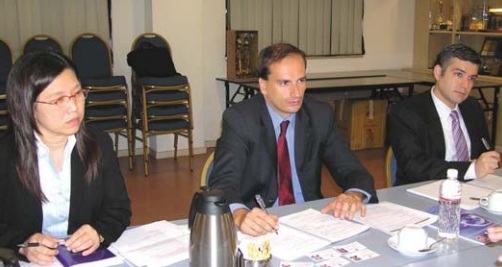On 26th August 2009, TEEAM received a visit from the World Bank. The delegates were Ms Annette Dixon (Country Director of World Bank, designated in Bangkok, Thailand), Mr Mathew Verghis (Lead Economist South East Asia) and Mr Philip Schellekens (Senior Economist).
TEEAM Officials present to receive them were Ir Steven Ng Khoon Hwa (Deputy President), Mr Yap Ching Kiat (Vice President), Engr Leong Kam Seng (Vice President), Mr Ho Khai Hong (Honorary Secretary) and Mr Suresh Kumar Gorasia (Past President).
The visitors aimed to collect information from trade associations for their case study related to global supply chains, and how the companies and supply network contribute to the economic crisis, consideration to be taken to benefit from the post crisis situation and how the government can upgrade the economy in the value chain.
The economies of Malaysia and Thailand have been strongly affected by the global economic and financial crisis. The importance of the tradables sectors in these economies meant that the plummeting of global demand produced a significant contraction in aggregate economic activity. What started off as a trade and manufacturingled slowdown quickly became a broad-based recession with the crisis spreading from tradables to non-tradables, from manufacturing to services, and from external to domestic demand.
A feature common to the tradable sectors of Malaysia and Thailand is the significant role of Japanese multinational corporations (MNCs) in foreign direct investment, manufacturing output and employment. The drop in external demand for Japanese cars and electronics in particular required adjustments which reverberated through the economies of Malaysia and Thailand. Following this initial impact, supporting industries in the manufacturing and services sectors, many of which being small and medium – sized enterprises (SMEs) were forced to adjust activity as well.
Malaysia and Thailand also share the common aspiration to leverage on their respective competitive advantages in the tradables sector in moving the economy up the value chain.
The case study aimed to understand how an important part of the corporate sector in Malaysia and Thailand (namely, large Japanese MNCs) has adjusted to the economic crisis and is planning for an eventual economic recovery, given the new post-crisis economic outlook. The focus will be not only on the companies themselves but also on their supply chains which includes the local SME sector.
TEEAM Officials shared their views and provided insights into how the Malaysian SMEs adapt to the global economic and financial crisis. It was a fruitful meeting with the guests from World Bank.

Representatives from World Bank – (from left) Ms Annette Dixon (Country Director of World Bank, designated in Bangkok, Thailand), Mr Mathew Verghis (Lead Economist South East Asia) and Mr Philip Schellekens (Senior Economist).
